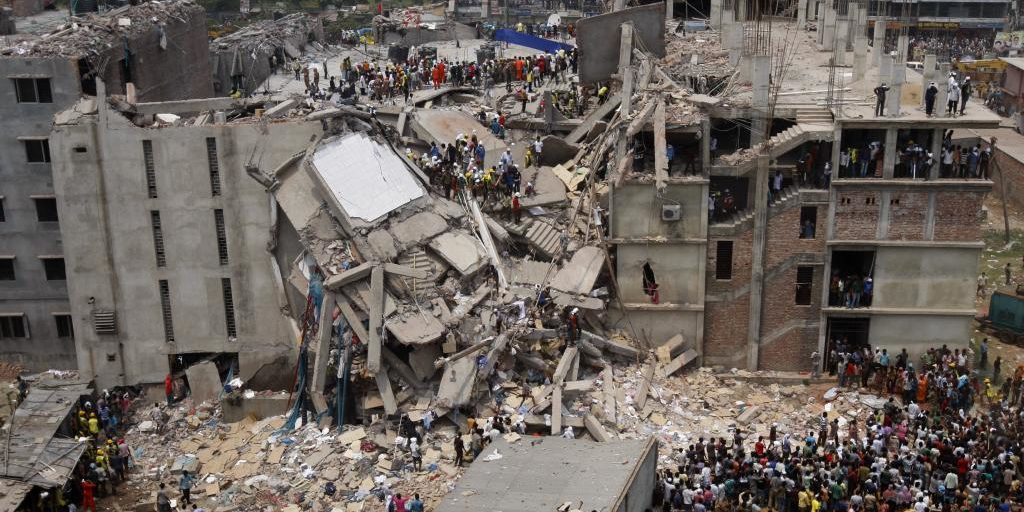Someone once observed that “behind every great fortune lies a great crime.” They might have been thinking of the garment industry in Bangladesh, among other great criminal enterprises.
Today, in Bangladesh, the world’s second largest garment exporter, you can go to prison for demanding rights and decent treatment for workers. Alternatively, or in addition, the business class friendly courts and police often act as strike-breakers.
Despite the fact that garment workers in the South Asian country generate 80 per cent of the country’s export income, (around $55 billion) or 16 per cent of the country’s gross national product, and despite some international attention and pressure for justice, workers this fall who protested a criminally inadequate increase in the minimum wage brought in by the government have been beaten and imprisoned, and, as of mid-November, over 20,000 of them face possible criminal charges. With the world apparel industry projected to bring in nearly $1.8 trillion dollars in 2024, there is clearly a lot of wealth being created by garment workers. So far, however, little of that wealth flows to the workers in Bangladesh’s factories, and government and business interests clearly mean to keep it that way.
The garment industry in Bangladesh has been notoriously hard on workers, with factory owners often cutting corners on worker safety and marshalling the courts and the police to break strikes and intimidate union activists. In 2013 over a thousand garment workers died in the collapse of the Rana Plaza garment factory, locked into a firetrap building by management.
While this unspeakable tragedy focused world attention on the savage exploitation suffered by workers in Bangladesh, and led to some useful reforms, particularly the Accord on Fire and Building Safety in Bangladesh, now the International Accord for Health and Safety in the Garment Industry the Bangladesh government continues to wage class war against the country’s workers, as evidenced by the events of the fall.
As reported by Vogue Business in January 11, 2024
“The Bangladeshi government has set the new monthly minimum wage at 12,500 taka (about $113) — just over half of the 23,000 taka (about $208) proposed by workers and unions when talks started in April. The trade unions that came together for the negotiations have called off the protests in order to redirect their efforts in the short term to incremental changes within individual factories, but they maintain that the minimum wage is still far below what’s needed to support a family in Bangladesh and a longer-term solution must be found.”
The Worker Rights Consortium, an international advocacy NGO, agrees, saying in a November, 2023 commentary: “While the proposed wage hike represents a small increase in real terms, history illustrates how quickly these gains will be reversed. The last minimum wage increase for garment workers in 2018 represented a similar hike of 13 per cent in the real wage since the previous increase in 2013. By the end of 2020, workers’ real wages had declined to their 2013 wage level. By 2023, workers were making 11 per cent less than they did a decade earlier. Inflation had completely, and predictably, eroded the minimum wage hike benefits.
If inflation in Bangladesh continues at current rates, the value of the pending wage increase will have been entirely eroded by 2026, at which point workers will be making, in real terms, less than they do currently—an amount that is leaving the majority of workers hungry and unable to afford basic healthcare or education for their children.”
Little wonder, then, that Kalpona Akter, executive director of the Bangladesh Center for Workers Solidarity and herself a former garment worker, told the Institute for Human Rights and Business in early December: “We don’t want relief programmes, we don’t need any training, we just want dignified wages. We just want the laws to be implemented and protect us. Brands can easily do that by working with our governments and adding more money with every garment they are sourcing. It is that easy. It is not complicated.”
All this class war skirmishing is being conducted in the context of troubled electoral politics and international relations. Recent elections in Bangladesh were boycotted by opposition parties and criticized by many international observers as flawed. The January elections returned the Awami League’s Sheikh Hasina to power, and with it the intransigent attitude toward workers reflected in the quote from her that introduces this column.
Meanwhile, the Israel/Palestine war is threatening expansion to a disastrous regional conflict: hostilities have already flared up in Syria, Iran, Iraq, Yemen and Pakistan, and the United States has drawn many of its allies, including Canada, into the pointless and bloody fray. While not entirely likey, it is also not entirely impossible that the regional tumult could involve Bangladesh as well. The growing conflict has already had economic impact on Bangladesh, closing the Red Sea/Suez Canal route from Bangladesh to markets in Europe and North America. Regional wars tend to expand and draw more and more nations into the vortex, and it is possible to imagine circumstances in which Bangladesh was more directly involved. Whether or not the long-suffering people of Bangladesh have to deal with cross border war as well as class war in the streets and factories of Dhaka, they are in for a troubled few years. It will be important for working people around the world to keep our eyes on Bangladesh and do what we can to support workers’ rights there. One small but real step that readers could take would be to donate to the fund raising being conducted to support legal aid for strikers and activists there by groups such as EKO. I urge you to consider a donation to EKO or to the Maquila Solidarity Network, a Canadian NGO with a long and honorable track record of solidarity work around the world.



